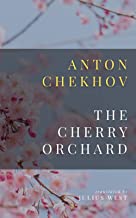The Cherry Orchard by Anton Chekhov 1904
This is Chekhov’s final play of his classic four works–The Seagull, Uncle Vanya, Three Sisters, and The Cherry Orchard–first performed just months before his death at the age of 44. The setting and the themes are familiar—-a formerly noble Russian family has run through their fortune and must sell their estate in order to survive. We have the usual suspects–the distracted and irresponsible mother and her brother, the gentle, vulnerable daughters, the heartless former peasant now turned financier who will ‘rescue’ them, the ethereal and philosiphising student, the former loyal serf.
The themes of memory, family love, inevitable change, the Russian soul, serfdom recur as the action moves from the threat of losing the estate and its hundred year old cherry orchard to the reality of its being bought at auction by the man whose father had been a peasant working on the estate. Madness, depression, penury all loom for the formerly noble family while the former peasants rise and Russia changes forever.
Reading this play was occasioned by our viewing a performance of a modern adaptation at Boston’s Paramount Theater. We were interested in seeing this production because Mikhail Barishnykov was cast in the role of Firs, the ancient and dying family servant. The play featured digital video effects, a robotic dog/cat, a deaf actor in the role of the tutor which required all the actors to use ASL, and Barishnykov, a surprisingly good actor and one who still moves with grace and beauty at the age of 74.



